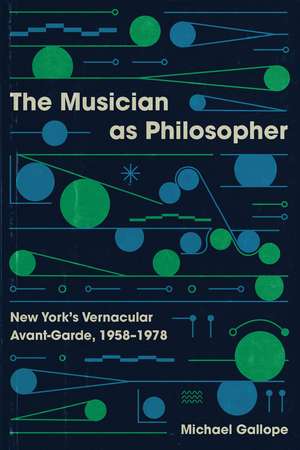The Musician as Philosopher: New York's Vernacular Avant-Garde, 1958–1978
Autor Michael Gallopeen Limba Engleză Paperback – 15 mar 2024
The Musician as Philosopher explores the philosophical thought of avant-garde musicians in postwar New York: David Tudor, Ornette Coleman, the Velvet Underground, Alice Coltrane, Patti Smith, and Richard Hell. It contends that these musicians—all of whom are understudied and none of whom are traditionally taken to be composers—not only challenged the rules by which music is written and practiced but also confounded and reconfigured gendered and racialized expectations for what critics took to be legitimate forms of musical sound. From a broad historical perspective, their arresting music electrified a widely recognized social tendency of the 1960s: a simultaneous affirmation and crisis of the modern self.
| Toate formatele și edițiile | Preț | Express |
|---|---|---|
| Paperback (1) | 215.51 lei 3-5 săpt. | +16.37 lei 7-13 zile |
| University of Chicago Press – 15 mar 2024 | 215.51 lei 3-5 săpt. | +16.37 lei 7-13 zile |
| Hardback (1) | 619.15 lei 6-8 săpt. | |
| University of Chicago Press – 15 mar 2024 | 619.15 lei 6-8 săpt. |
Preț: 215.51 lei
Nou
Puncte Express: 323
Preț estimativ în valută:
41.24€ • 42.81$ • 34.39£
41.24€ • 42.81$ • 34.39£
Carte disponibilă
Livrare economică 01-15 martie
Livrare express 15-21 februarie pentru 26.36 lei
Preluare comenzi: 021 569.72.76
Specificații
ISBN-13: 9780226831763
ISBN-10: 0226831760
Pagini: 320
Ilustrații: 22 halftones
Dimensiuni: 152 x 229 x 25 mm
Greutate: 0.43 kg
Ediția:First Edition
Editura: University of Chicago Press
Colecția University of Chicago Press
ISBN-10: 0226831760
Pagini: 320
Ilustrații: 22 halftones
Dimensiuni: 152 x 229 x 25 mm
Greutate: 0.43 kg
Ediția:First Edition
Editura: University of Chicago Press
Colecția University of Chicago Press
Notă biografică
Michael Gallope is associate professor of cultural studies and comparative literature at the University of Minnesota. He is the author of Deep Refrains: Music, Philosophy, and the Ineffable, also published by the University of Chicago Press.
Cuprins
Introduction
Part I: Maps
Chapter 1
Part II: Studios
Chapter 3
Conclusion
Acknowledgments
Archival Collections
Notes
Index
Part I: Maps
Chapter 1
Affect—Praxis
Chapter 2Veils—Atmospheres
Global Inequities
Intentionality and Grammar
Plays of Recognition
Atmospheres
Intentionality and Grammar
Plays of Recognition
Atmospheres
Part II: Studios
Chapter 3
David Tudor, Esoteric Spectacle . . . c. 1958
Tudor’s Pianism of the 1950s
Cage’s Noumena of the 1950s
Tudor—Cage—Graph J
Ferocious Ineffability
Chapter 4Cage’s Noumena of the 1950s
Tudor—Cage—Graph J
Ferocious Ineffability
Ornette Coleman, Utopian Intentionalities . . . c. 1966
Bebop Historicity
Deskilling Intentionalities
Vernacular Utopias
Harmolodic Ineffability
Chapter 5Deskilling Intentionalities
Vernacular Utopias
Harmolodic Ineffability
The Velvet Underground, Eleven Rooms . . . c. 1967
Drone Alchemy
Afro-magnetism
Atmospheric Rooms
Attitudinal Virtuosity
Vital Tape
Chapter 6Afro-magnetism
Atmospheric Rooms
Attitudinal Virtuosity
Vital Tape
Alice Coltrane, Divine Injunctions . . . c. 1971
Afrocentric Spiritualities
Ornamental Apparitions
Coltrane’s Philosophy
Divine Injunctions
Afro-futurity
Chapter 7Ornamental Apparitions
Coltrane’s Philosophy
Divine Injunctions
Afro-futurity
Patti Smith—Richard Hell, Forces . . . c. 1974
Punk Primitivism
Poetry, Alchemy, Force
Paradoxes of the Erotic
The Aura of Unknowing
Poetry, Alchemy, Force
Paradoxes of the Erotic
The Aura of Unknowing
Conclusion
A Materialist Music History
Acknowledgments
Archival Collections
Notes
Index
Recenzii
"“In his first book Deep Refrains: Music, Philosophy and the Ineffable (2017), musician and academic Michael Gallope explored the ways in which music inspired modern European philosophers. With The Musician as Philosopher, he turns to the philosophical thinking of musicians themselves, with a focus on the ‘strange, intense, disorienting’ musical irruptions of New York’s postwar avant-grade. It’s refreshing to see [Ornette] Coleman’s philosophy taken seriously and Gallope pays equal respect to Alice Coltrane's engagement with Eastern philosophy. The Coltrane chapter is perhaps the richest in the book, bringing her musical and spiritual practices together… While tracing the commonalities between these artists, Gallope recognizes the complex dynamics of class, race, gender and sexuality… He describes his approach as an immanent critique and it would be fascinating to read his take on the vernacular avant grades of disc, hip-hop and no wave, all vital sites of hyperfracture and alchemy."
"Michael Gallope’s The Musician As Philosopher is an inspired and dilative look at the maelstrom of creative work in music and sound emanating from thinkers and doers living and working in mid-twentieth century New York City. . . . Pivoting fluidly between sound and media analyses, aesthetics, political economy, musicology, and critical perspectives on praxis, reception, and consumption, Gallope presents new frameworks for understanding some of the thinking and feeling behind the recorded works now canonized as exemplars of a gritty and resourceful vernacular avant-garde. . . .Understanding these musicians as philosophers, Gallope offers readers a deep history of sounds, styles, and ideas that ushered in music’s future."
"The Musician as Philosopher counts to my mind as the highest achievement to date of Michael Gallope’s already storied career. In work ranging from history to high theory and taking in everything from philosophy to recording technologies and extended techniques to a large array of documentary archives, The Musician as Philosopher gives us a nuanced dive into an American avant-garde previously unimagined, and emerges with a persuasive thesis: that a diverse strain of experimental American musicians of the 1950s-1970s were resistant vernacular philosophers. Wildly divergent in their positions, mainstream to minoritized, and making use of different affordances, they nevertheless shared a driving ambition to push the boundaries of conventional musicking in ways diversely aligned with utopianism, mysticism, and Black traditions, and with common inclinations toward valuing process over product, exploring non-Westernisms, and experimenting variously with esotericism, ecstasy, deskilling, “oblique metaphysics,” irony, hallucination, self-shedding, nihilisms, and other kinds of what Gallope calls “alchemies.” Here at last is a book that shows brilliantly how to write history and philosophy at the same time."
" . . . . anyone seriously interested in
the artists concerned will find much to get
their teeth into here."
the artists concerned will find much to get
their teeth into here."
